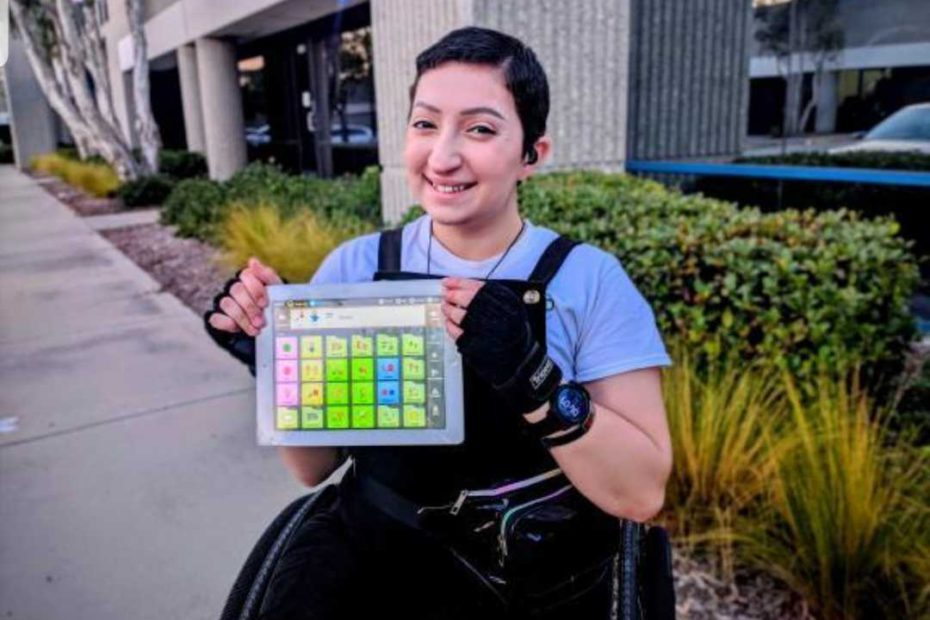Drewy NovaClara Curious is a Model, actor, and a disability advocate living in San Diego, California. They are a deaf and semi verbal autistic first introduced to AAC when they lost their hearing as a kid. Today, Drewy uses Avaz AAC as one of their modes of communication. In this guest blog for Avaz, Drewy shares their experiences with AAC and their endeavours towards encouraging inclusion and acceptance.
I have been semiverbal my whole life, but speaking was no longer an option for me once I could no longer hear myself. AAC has allowed me to be left out of the conversation less and included more. While I can communicate in American Sign Language, I know the majority of people I meet won’t know sign language. In these situations, my AAC app is tremendously helpful!
AAC is a communication bridge for me on good days because it shuts down communication barriers. It’s my main communication on “bad” days meaning the days when I struggle with language processing. It also helps me become part of important conversations. Someone was saying very unkind things to a friend I was with one day. They’re a shy person and they don’t usually say anything if they’re bullied. I was able to tell the mean person to back off and leave my friend alone. I couldn’t do that before I had Avaz app.
What I Wish People Understood
I wish people were less impatient about waiting for me to finish my message. Not everyone who is semi verbal is the same. We’re all different. Some of us speak, some don’t, some write, some sign, some use an AAC, some don’t. Just because someone can’t SPEAK, it doesn’t mean they can’t TALK. We have just as much to say as anyone else.
For young AAC users (all AAC users actually), there is much isolation. Many abled or neurotypical children are afraid of AAC users often because they don’t understand. People have a habit of ignoring me because they don’t know how to talk to me. They act as if I’m not there and even talk about me using third person language instead of just talking to me.
About Stim Positivity
I want to spread the message #StimFreely. There has been a horrid amount of negativity, judgment, and discrimination against stimming. I grew up with the phrase “quiet hands” being repeated over and over. I was taught to not stim. Because of this attitude, so many autistics suppress their stims or only stim when no one can see. It’s so important for neurodiverse individuals to have freedom to stim. Not just for sensory regulation but emotional too. Much of my emotion is expressed through stimming. Similar to how my dog wags her tail super fast when she’s happy, I flap my hands and arms and bounce up and down. Stims should never be shamed. Something I love about stimming is it helps me identify my own emotions better as well as it helps me feel emotions stronger. Such as joy. I like to play music on my headphones at full volume with my sensory lights on in my room because it fills me with joy and it’s a wonderful sensory experience. I try to do this a few times a day especially on bad days. It helps me handle the bad feelings and better navigate my day and tasks ahead of me.
About Advocacy
I am currently signed with the talent agency Zebedee Management. Zebedee’s talent is entirely made up of disabled individuals. I love working with them because I get to be included in just regular Hollywood/media projects that I wouldn’t have an opportunity to do otherwise.
I don’t see much representation at all of AAC users in the media and Hollywood. As an actor, I hope to be a part of changing that. I feel children and people in general would feel that AAC users are less “alien” if they get to see them in normal settings such as on TV and in Movies. Just being present in more media is a statement. It says “I’m here, I’m disabled, I made it and you can too.” I post to my Instagram and TikTok everyday, multiple times a day. I use my platforms to educate about several topics through writing and videos. I want to show that you don’t need to speak to be heard.


We are grateful to Drewy NovaClara Curious for these insightful points and observations about AAC and stim positivity. We wish them all the best in their career and their quest for inclusion and acceptance.

